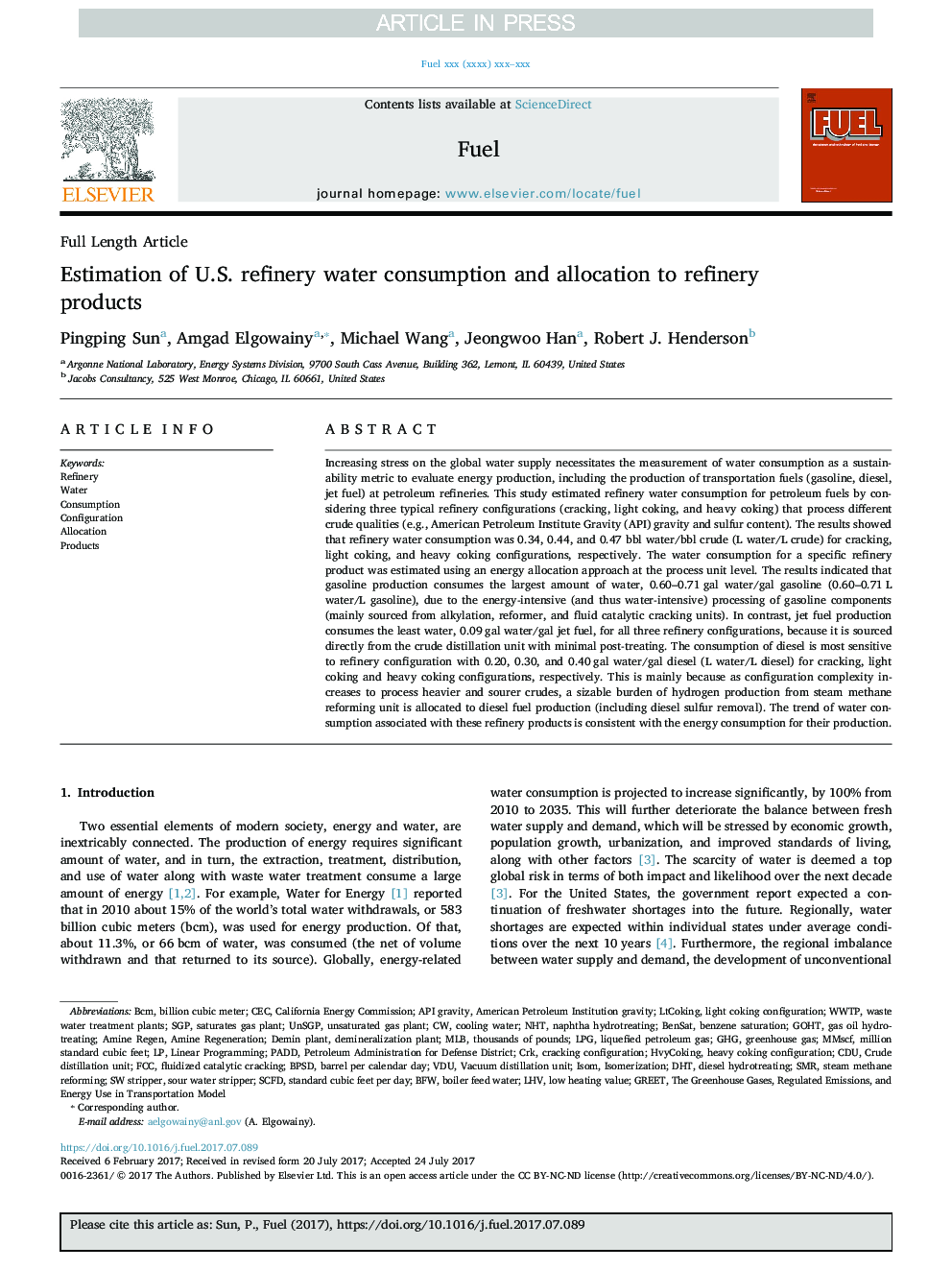| کد مقاله | کد نشریه | سال انتشار | مقاله انگلیسی | نسخه تمام متن |
|---|---|---|---|---|
| 6631591 | 1424943 | 2018 | 16 صفحه PDF | دانلود رایگان |
عنوان انگلیسی مقاله ISI
Estimation of U.S. refinery water consumption and allocation to refinery products
ترجمه فارسی عنوان
برآورد مصرف و تخصیص آب پالایشگاه در ایالات متحده برای محصولات پالایشگاهی
دانلود مقاله + سفارش ترجمه
دانلود مقاله ISI انگلیسی
رایگان برای ایرانیان
کلمات کلیدی
SMRVDUSGPNHTIsomMLBCDUCrkBPSDBCMCECDHTLPGBFWAPI gravityLHVWWTPGHGFCCWater - آبBoiler feed water - آب تغذیه بویلرCooling water - آب خنک کنSteam methane reforming - اصلاح کردن متان بخارIsomerization - ایزومریزاسیونLinear programming - برنامهریزی خطیAllocation - تخصیصFluidized catalytic cracking - ترک خوردگی کاتالیزور مایعRefinery - تصفیه خانهGREET - سلامProducts - محصولاتConsumption - مصرفLow heating value - مقدار گرما کمCrude Distillation Unit - واحد تقطیر خالصConfiguration - پیکربندیCalifornia Energy Commission - کمیسیون انرژی کالیفرنیاliquefied petroleum gas - گاز مایع شدهGreenhouse gas - گاز گلخانه ایwaste water treatment plants - گیاهان تصفیه فاضلاب
موضوعات مرتبط
مهندسی و علوم پایه
مهندسی شیمی
مهندسی شیمی (عمومی)
چکیده انگلیسی
Increasing stress on the global water supply necessitates the measurement of water consumption as a sustainability metric to evaluate energy production, including the production of transportation fuels (gasoline, diesel, jet fuel) at petroleum refineries. This study estimated refinery water consumption for petroleum fuels by considering three typical refinery configurations (cracking, light coking, and heavy coking) that process different crude qualities (e.g., American Petroleum Institute Gravity (API) gravity and sulfur content). The results showed that refinery water consumption was 0.34, 0.44, and 0.47 bbl water/bbl crude (L water/L crude) for cracking, light coking, and heavy coking configurations, respectively. The water consumption for a specific refinery product was estimated using an energy allocation approach at the process unit level. The results indicated that gasoline production consumes the largest amount of water, 0.60-0.71Â gal water/gal gasoline (0.60-0.71Â L water/L gasoline), due to the energy-intensive (and thus water-intensive) processing of gasoline components (mainly sourced from alkylation, reformer, and fluid catalytic cracking units). In contrast, jet fuel production consumes the least water, 0.09Â gal water/gal jet fuel, for all three refinery configurations, because it is sourced directly from the crude distillation unit with minimal post-treating. The consumption of diesel is most sensitive to refinery configuration with 0.20, 0.30, and 0.40Â gal water/gal diesel (L water/L diesel) for cracking, light coking and heavy coking configurations, respectively. This is mainly because as configuration complexity increases to process heavier and sourer crudes, a sizable burden of hydrogen production from steam methane reforming unit is allocated to diesel fuel production (including diesel sulfur removal). The trend of water consumption associated with these refinery products is consistent with the energy consumption for their production.
ناشر
Database: Elsevier - ScienceDirect (ساینس دایرکت)
Journal: Fuel - Volume 221, 1 June 2018, Pages 542-557
Journal: Fuel - Volume 221, 1 June 2018, Pages 542-557
نویسندگان
Pingping Sun, Amgad Elgowainy, Michael Wang, Jeongwoo Han, Robert J. Henderson,
